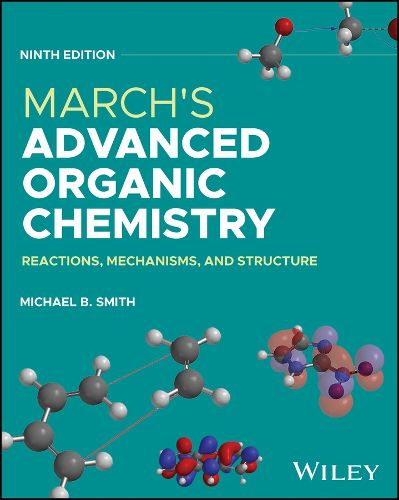Readings Newsletter
Become a Readings Member to make your shopping experience even easier.
Sign in or sign up for free!
You’re not far away from qualifying for FREE standard shipping within Australia
You’ve qualified for FREE standard shipping within Australia
The cart is loading…






Leading reference on the theories of organic chemistry, now updated to reflect the most recent literature from 2018 to 2023
Building on the success of the 8th Edition as winner of the Textbook & Academic Authors Association 2021 McGuffey Longevity Award, the revised and updated 9th Edition of March's Advanced Organic Chemistry explains the theories of organic chemistry, covers new advances in areas of organic chemistry published between 2018 and 2023, and guides readers to plan and execute multi-step synthetic reactions. Detailed examples and descriptions of all reactions are included throughout the text.
As in previous editions, the goal of this edition is to give equal weight to three fundamental aspects of the study of organic chemistry: reactions, mechanisms, and structure. Specific but specialized areas of organic chemistry, such as terpenes, polymerization, and steroids, have been incorporated into primary sections rather than segregated into their own sections.
The first nine chapters cover general organic chemistry with theoretical principles. The next 10 chapters address reactions and mechanistic discussion. Appendix A focuses on literature references and resources.. More than 4,400 references are included throughout the text.
March's Advanced Organic Chemistry provides information on:
Localized and delocalized chemical bonding and bonding weaker than covalent Microwave chemistry, use of ultrasound, mechanochemistry, and reactions done under flow conditions Acids and bases, irradiation processes, stereochemistry, structure of intermediates, and ordinary and photochemical reactions Mechanisms and methods of determining carbocations, carbanions, free radicals, carbenes, and nitrenes Aliphatic, alkenyl, and alkynyl substitution, additions to carbon-carbon and carbon-hetero bonds, eliminations, rearrangements, and oxidations and reductions
This 9th Edition of March's Advanced Organic Chemistry continues to serve as a must-have reference for every student and professional working in organic chemistry or related fields.
$9.00 standard shipping within Australia
FREE standard shipping within Australia for orders over $100.00
Express & International shipping calculated at checkout
Leading reference on the theories of organic chemistry, now updated to reflect the most recent literature from 2018 to 2023
Building on the success of the 8th Edition as winner of the Textbook & Academic Authors Association 2021 McGuffey Longevity Award, the revised and updated 9th Edition of March's Advanced Organic Chemistry explains the theories of organic chemistry, covers new advances in areas of organic chemistry published between 2018 and 2023, and guides readers to plan and execute multi-step synthetic reactions. Detailed examples and descriptions of all reactions are included throughout the text.
As in previous editions, the goal of this edition is to give equal weight to three fundamental aspects of the study of organic chemistry: reactions, mechanisms, and structure. Specific but specialized areas of organic chemistry, such as terpenes, polymerization, and steroids, have been incorporated into primary sections rather than segregated into their own sections.
The first nine chapters cover general organic chemistry with theoretical principles. The next 10 chapters address reactions and mechanistic discussion. Appendix A focuses on literature references and resources.. More than 4,400 references are included throughout the text.
March's Advanced Organic Chemistry provides information on:
Localized and delocalized chemical bonding and bonding weaker than covalent Microwave chemistry, use of ultrasound, mechanochemistry, and reactions done under flow conditions Acids and bases, irradiation processes, stereochemistry, structure of intermediates, and ordinary and photochemical reactions Mechanisms and methods of determining carbocations, carbanions, free radicals, carbenes, and nitrenes Aliphatic, alkenyl, and alkynyl substitution, additions to carbon-carbon and carbon-hetero bonds, eliminations, rearrangements, and oxidations and reductions
This 9th Edition of March's Advanced Organic Chemistry continues to serve as a must-have reference for every student and professional working in organic chemistry or related fields.